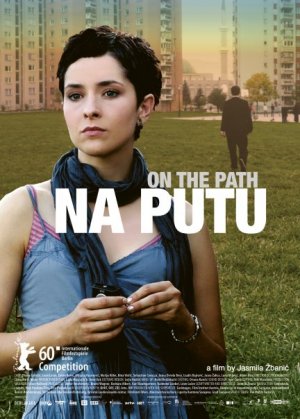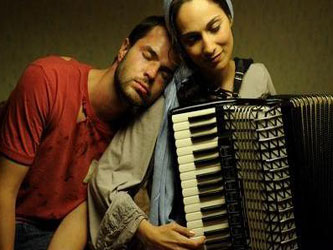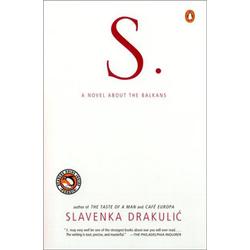Sarajevo Film Festival Review
Without wishing to sound redundant of the film descriptions on the website, I would like to point out a few regional films that I saw last week at the 2010 Sarajevo Film Festival. As previously mentioned, the festival holds a large international appeal, with visitors and films from all around the world. The festival was well organized, and tickets ranged from 2.5-7 euros. Based on my interests, I mainly watched films from Southeast Europe.
In my opinion, the idea for the plot of Na Putu (On the Path; Bosnia and Herzegovina, Austria, Germany and Croatia, 2010) was extremely interesting. The film portrayed a young couple Luna and Amar, very much in love, living in Sarajevo and trying to have a baby. Although from Muslim background, they do not attend mosque or practice their religion. After getting fired from his job, Amar accepts a well-paid job at a Wahhabi commune. The viewers watch as this fundamentalist Muslim community influences Amar’s personal beliefs, and inevitably, his relationship with his wife Luna. I found the character development to be very weak in this film, and it is hard to believe Amar’s drastic transition. However, the film is valuable in that it teaches something about the Wahhabi community in Bosnia, and how they clash with the moderate Muslims in the country. Although I am not very familiar with this group, the film prompted me to do a little investigation.
The fundamentalist Wahhabi movement is a radical group which preaches a ‘pure Islam.’ It originated in Saudi Arabia in the early 18th century and preaches religious intolerance towards other religious groups, including moderate Muslims. Wahhabi Muslims first came to Bosnia during the war to fight on the side of the Muslims, and many have remained in the country since. They preach about a traditional Islam, have some schools around Bosnia, and even have operated a terrorist training camp in Southern Serbia. According to one article, there is a growing number of Al Qaida sympathizers in Bosnia. According to another article, Islamic studies experts consider this group a threat, and that most of their support comes from Saudi Arabia. The article also states that according to intelligence sources, Five of the ‘9/11’ attackers had served as Wahhabi sponsored fighters in Bosnia. Although I cannot comment on the accuracy of the portrayal of this community in Na Putu, I felt that the film provided a fascinating insight into the lives of Wahhabi Muslims in Bosnia.
Zajedno (Together), a documentary from Croatia (2009), featured other underrepresented communities in the region. The film seemed rather low-budget, and it mainly consisted of interviews about the relationships of different people and couples. For example, a lesbian couple is followed, and one can see how they act differently in Zagreb than in a smaller town in Croatia. Many people are not accepting of their relationship. The film also centers around members of the handicapped community in Croatia, and their limitations in society. This film was not my favorite, but was valuable and even funny at times as various couples commented about love and relationships.
I found Sevdah za Karima (Sevdah for Karim, Bosnia and Herzegovina, Hungary, Croatia 2010) to be a gem of the festival. The cinematography was artistic and interesting, and the character development believable and subtle. Viewers witness the feeling of despair that young adults had in Bosnia immediately after the war. The film centers around Karim, a Muslim man from Sarajevo. He seems to be in his twenties right after the war finishes. He is a failed philosophy student, trying to provide for his sister. Despite the fact that his parents were killed by a mine during the war, and that Karim himself lost a leg from a mine, he took a job clearing mines in the mountains of Bosnia. Obviously, this was not an easy film to watch. The whole audience held their breath as Karim and his colleagues cleared mine fields. They were not always successful at this highly dangerous job. Karim had many friends who got mixed up in drugs and violence after the war. Also, many of his friends from work decided to take jobs with the US military deployment in Iraq. As a young person currently in my twenties, I thought about what I would do if I were in the position of the characters in this film. Sevdah za Karima shows how the war continued long after the peace agreements were signed.
Lastly, the best film that I saw from the region last week was Kao da me nema (As If I am not There, Ireland 2010). The film was based on a book by my favorite author, Slavenka Drakulic. She is a journalist and author from Croatia and has written many books and articles about the region. I respect her ability to include just enough personal information into her writing about life in the former-Yugoslavia. Her books are extremely insightful and well-researched, but they are enjoyable and read like novels. This film was based on the book As If I am not There, which is called “S” on the English translation. S. is the initial of the main character of the book… a young teacher in her 20s from Sarajevo, who accepts a job in a mountain village school in Bosnia. One morning she wakes up and is told to board a bus and leave her home. Women listen as the men in the village are killed, and they are forced to board buses and live for many months in a camp run by Serbian soldiers. The film follows this school teacher, as she was selected for the “Women’s Room” in the camp, subjected to constant rape and violence. The story shows how she survives this horrible part of her life, and how she deals with the emotional aftermath. The novel and film both begin with this aftermath – S. is in a hospital in a foreign country, trying to deal with her newborn, unwanted child, that only instigates horrible memories.
I felt privileged to watch this film at the festival. Many of the actors were present, and my idol Slavenka Drakulic herself. It was actually the first time she herself saw this film based on her book. Sitting in the theatre, I have never in my life felt so affected by a film. I felt completely paralyzed in my chair, unable to turn away from the horrible actions taking place on the big screen in front of me. In fact, a noticeable amount of people actually left the theatre, unable to watch. Despite the difficulty of this film, it was perhaps the most powerful film I have ever seen and I would recommend both the book and the film to anyone interested in the wars surrounding breakup of Yugoslavia. Usually I like books better than the films based on books, but I felt that in this case, both the film and the novel had something different to offer. In the book, readers witness more character development as they read the most intimate thoughts of the main character. A film cannot provide such detailed thoughts. However, the visual aspect of the film forced the viewers to watch the events taking place. Although the book described the same horrible events, I was able to keep some distance while reading that I was unable to maintain while watching the film.
All in all, I immensely enjoyed the film festival, and I hope to attend next year. Films from this region are not so accessible in the United States, and this was a great opportunity for me to watch some of the best films from Southeast Europe with English subtitles.



